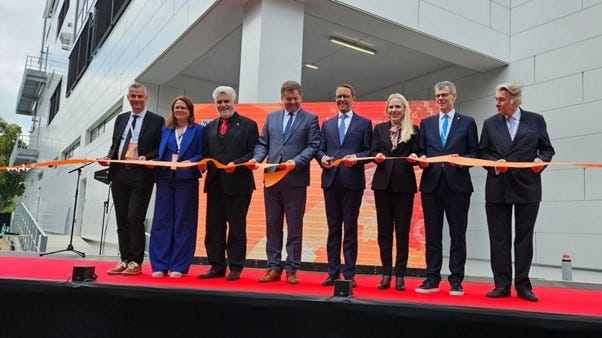Germany Creating Capacity to Produce Over One Billion mRNA Vaccine Doses Per Year
The globalists are not giving up on this technology and the only way it can work for them is with mandates coupled to fear campaigns.
Article by Robert Kogon
Jul 04, 2024
Last month, the biotech division of the German firm Wacker inaugurated a spanking new mRNA production facility in Halle, where, per the company, il will be able to manufacture up to 200 million doses of mRNA vaccines per year. The facility reportedly cost some €100 million to build.
But 200 million doses of mRNA vaccines for what?
The only mRNA vaccines to be marketed thus far are, of course, the COVID-19 mRNA vaccines; innumerable safety issues have been and continue to be raised about those products; even some of their most fervent promoters have, in the meanwhile, raised questions about their performance, and it is now nearly universally, if often just tacitly, acknowledged that they do not do what they were authorized to do – namely, prevent COVID-19; and, in any case, the COVID-19 pandemic, if it ever truly was, has been officially over for two years now.
So, why did Wacker invest €100 million in a factory to produce mRNA vaccines for a non-existent market and how could it even afford to do so?
The Minister of the Economy of the German state of Saxony-Anhalt, Sven Schulze, was on hand for the inauguration ceremony, and even he appeared to be somewhat perplexed about what he was doing there. “It’s actually a little bizarre,” he told Germany’s ARD public television with a sheepish smile, “We hope that this sort of thing doesn’t happen again, the COVID pandemic is behind us….”
But the solution to the riddle is to be found on the federal level: in German government policy and largesse. For even if the public’s taste for mRNA drugs has waned, to say the least, the German government’s devotion to them has never foundered. This is hardly surprising since, as touched upon here, here and here, the German government has made mRNA manufacturing into a central plank of its industrial policy in the hope of turning the country into a global “hub” for mRNA vaccines.
Thus, already in March 2022, the German government announced that it had concluded so-called “pandemic preparedness contracts” with no less than five manufacturers or consortiums to reserve vaccine manufacturing capacity for future use. The recipients of the contracts included Germany’s leading mRNA companies BioNTech and CureVac (in partnership with GSK), as well as Wacker, Celonic and IDT Biologika.
As the ÄrzteZeitung, a specialized German newspaper for MDs, noted at the time, “of the suppliers, only BioNTech … has a product on the market to date.” BioNTech is, of course, the developer and legal manufacturer of what is more commonly known outside of Germany as the “Pfizer” COVID-19 vaccine. CureVac also had a COVID-19 vaccine candidate, but it did not gain approval.
Total government payments to the companies from 2022 through 2029 are supposed to total nearly €3 billion.
The capacity was ostensibly being reserved for domestic German usage. But given the sheer size of the capacity being reserved, with each of the companies or consortiums committing to production of up to 80 million doses annually – and BioNTech saying it would produce at least that much – this justification never made much sense. Why would a country of just 80 million people need 400 million or more vaccine doses per year?
Note, furthermore, that as mentioned above, Wacker alone has in fact created capacity to produce up to 200 million doses under the aegis of the program. So, if the other participants have done or are doing likewise, we will in fact be seeing capacity for up to one billion doses per year being created.
The new capacity, moreover, is in addition to the capacity of BioNTech’s already existing mRNA manufacturing facility in Marburg, which the company purchased in 2020 in anticipation of the approval and rollout of its COVID-19 vaccine. That facility, per the company’s own figures, would give BioNTech alone the capacity to manufacture some 750 million doses annually. So, total German capacity will presumably reach over 1.5 billion doses per year – obviously far more than just the German domestic market could ever absorb. In the spirit of the vaccine “hub” project, the more plausible rationale for the program and the de facto subsidies is thus to create and maintain German capacity to supply the European and global markets. This is indeed obliquely admitted in the original German government press release, which notes that the contracts are “internationally expandable” and will thus “also make an important contribution to EU-wide and global vaccine supply in the medium- and long-term.”
From an article published by Daily Sceptic (which has a paywall, so I grabbed this from the PANDA website).






Clearly, they are planning to murder a lot of people!
Revolt will happen in the US if the shots are mandated. Glad to be in Florida.